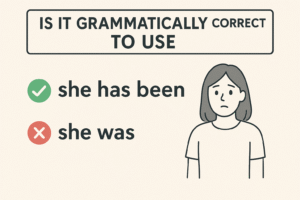“Is It Grammatically Correct to Use “She Has Been” or “She Was”?Grammar Puzzle Solved (8)
English learners often wonder, “Is it grammatically correct to use ‘she has been’ or ‘she was’? Which one is better?” Both phrases are correct but serve different purposes in English grammar. Understanding when to use each helps you speak and write clearly.
“She has been” belongs to the present perfect tense. We use it to talk about actions or states that started in the past and continue into the present or have relevance now. For example:
-
“She has been sick for two days.” (She started being sick two days ago and still is.)
-
“She has been working here since 2019.” (She started working in 2019 and continues now.)
On the other hand, “she was” uses the simple past tense. We use it to talk about actions or states that happened and finished entirely in the past. For example:
-
“She was sick last week.” (Her sickness was in the past and is now over.)
-
“She was working here in 2018.” (She worked here in 2018 but not now.)
Choosing between “she has been” and “she was” depends on the context and the time frame you want to express. If the action still affects the present or happened recently, use “she has been.” If it occurred in the past with no current connection, use “she was.”
Many learners struggle with these forms because similar phrases in other languages don’t always match English usage. However, mastering this difference improves your grammar and helps you sound more natural.
In conclusion, both “she has been” and “she was” are grammatically correct. The better choice depends on whether you want to express ongoing relevance or a completed past event. Practice using both to get comfortable with their unique meanings.

Subject-Verb Agreement:
https://grammarpuzzlesolved.englishlitnotes.com/subject-verb-agreement-with-or-nor/
The Squire in The Canterbury Tales:
https://englishlitnotes.com/2025/05/23/the-squire-in-general-prologue/
First Year at Harrow: https://englishwithnaeemullahbutt.com/2025/06/02/first-year-at-harrow/
Henry David Thoreau: https://americanlit.englishlitnotes.com/henry-david-thoreau/
Discover more from Grammar Puzzle Solved by Naeem Ullah Butt
Subscribe to get the latest posts sent to your email.